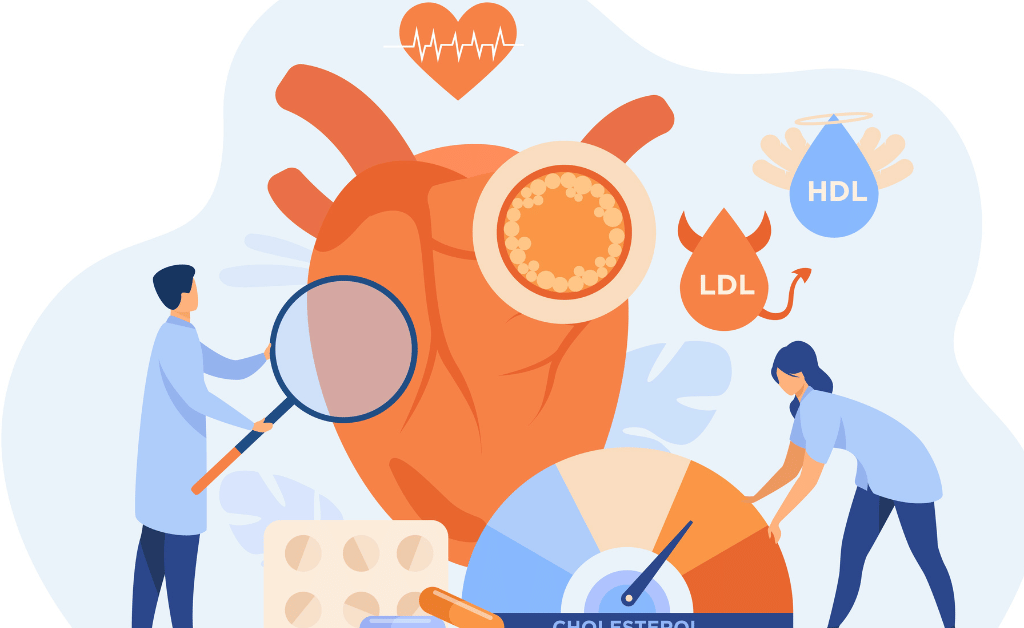Cholesterol—you’ve heard the word, but do you truly understand its impact on your health? It quietly flows through your bloodstream, performing essential functions. But when it’s out of balance, it becomes a major risk factor for heart disease, stroke, and other chronic illnesses.
In this article, we break down:
✔ What cholesterol is and why it matters
✔ Silent symptoms of high cholesterol
✔ Foods to avoid to protect your heart
✔ Proven tips to control cholesterol levels naturally

🧬 What Is Cholesterol?
Cholesterol is a waxy, fat-like substance found in every cell of your body. It plays vital roles, such as:
- Producing hormones
- Supporting vitamin D synthesis
- Creating digestive bile acids to break down fats
There are two main types of cholesterol:
LDL (Low-Density Lipoprotein) — the “bad” cholesterol that can clog arteries and raise your risk of heart disease
HDL (High-Density Lipoprotein) — the “good” cholesterol that helps remove excess LDL from your bloodstream
🚨 Symptoms of High Cholesterol
High cholesterol often goes unnoticed until it causes serious problems — which is why it’s often called the “silent killer.” However, some warning signs may indicate elevated levels:
- Chest Pain (Angina): A buildup of cholesterol can reduce blood flow, causing pressure or tightness in the chest.
- Heart Attack: A sudden blockage of arteries due to cholesterol buildup can trigger a heart attack.
- Stroke: Restricted blood flow to the brain due to clogged arteries may lead to a stroke.
- Xanthomas: Yellowish fatty deposits under the skin or on tendons — a visual sign of high cholesterol.
🔎 Note: Many people don’t experience any symptoms at all. That’s why regular cholesterol checks are vital, especially if you have risk factors like family history, obesity, smoking, or diabetes.
🍟 Foods to Avoid to Lower Cholesterol
Your daily meals directly impact your cholesterol levels. Here are foods you should limit or avoid:
✘ Fried Foods
Deep-fried items like French fries, chicken nuggets, and samosas are loaded with trans fats — a major driver of high LDL.
✘ Processed Meats
Bacon, sausages, and deli meats are packed with saturated fats and sodium. Choose lean or plant-based alternatives instead.
✘ Sugary Desserts
Cookies, cakes, pastries, and ice cream often contain both sugar and trans fats, which raise bad cholesterol and promote weight gain.
✘ Butter and Margarine
These contain unhealthy fats. Swap them for olive oil, ghee (in moderation), or avocado spread.
✘ Full-Fat Dairy
Whole milk, cream, and full-fat cheese may raise LDL. Go for low-fat dairy or plant-based milk like almond, oat, or soy.
✔ How to Control and Lower Cholesterol Naturally
You don’t have to rely only on medications — lifestyle changes can work wonders. Here’s how to keep your cholesterol in a healthy range:
1. 🥦 Eat Heart-Healthy Foods
- Load up on fruits, vegetables, whole grains, nuts, and legumes
- Foods high in soluble fiber (like oats, apples, and beans) help remove excess LDL
2. 🐟 Choose Lean Proteins
- Opt for fatty fish (like salmon and mackerel), skinless chicken, or tofu
- Limit red meat and choose plant-based meals several times a week
3. 🏃♂️ Get Moving
- Aim for 150 minutes of moderate exercise each week
- Activities like brisk walking, cycling, swimming, or dancing help raise HDL and lower LDL
4. 🚭 Quit Smoking
- Smoking lowers your good cholesterol and damages arteries, accelerating plaque buildup
5. 💊 Consider Medication
If lifestyle changes aren’t enough, talk to your doctor about statins or other medications to manage your cholesterol levels safely
❤️ Final Thoughts: Take Charge of Your Cholesterol Today
High cholesterol might not cause immediate symptoms — but its long-term effects can be devastating. The good news? It’s entirely manageable through diet, exercise, and healthy habits.
Start by making small changes:
- Swap fried for baked
- Add more fiber to meals
- Move your body daily
- Stay consistent with your checkups
Your heart will thank you for it — and your body will reward you with energy, vitality, and better health.
also read this:
Unveiling the Nutritional Marvel: Sesame Seed Oil
The Effects of Cutting Out Sugar: What Happens Over Time (One Week, One Month, One Year)



